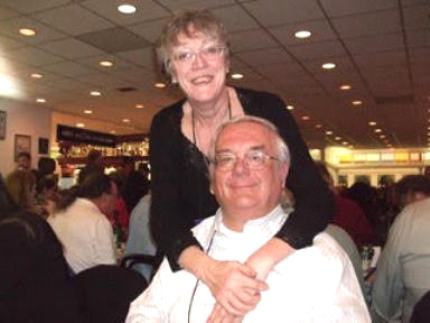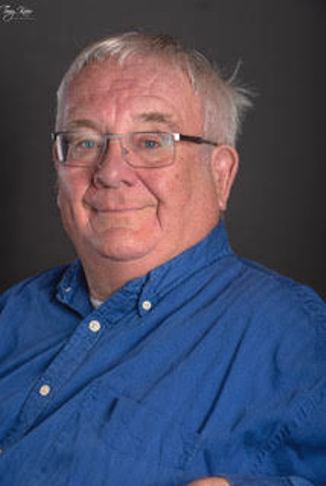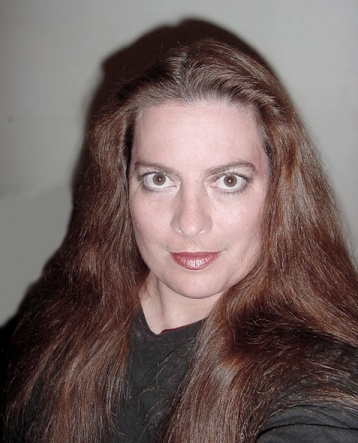

On this month's Special Page:
A brand-new, exclusive interview with horror great Ramsey Campbell
IN THE "SPECIAL PAGE" ARCHIVES:
John McLoughlin
Ray Garton
Jonathan Maberry
Trish Wilson
J.G.Faherty
Nancy Kilpatrick
AN INTERVIEW WITH RAMSEY CAMPBELL
BY TRISH WILSON
TRISH WILSON: How did you first get into writing horror?
RAMSEY CAMPBELL: Really to repay some of the pleasure the field had already given me. By the age of eleven I’d read all the available classics of horror and some lesser stuff too, and I’m afraid some of the qualities of both show up in my earliest attempts. I’d completed a book of stories by the time I was twelve – Ghostly Tales – though ghastly might have been a better term for the patched-together monsters of prose it contained. One story, “Bradmoor”, was modelled on the dreadful Dennis Wheatley, presumably no relative of the talented Ben. Here’s the opening:
Come at once. I am in a horrible trap.
Frank.
That was all. Just ten words. All that was in a letter that I read over a cup of coffee. I am a private psychic investigator, and in my profession I naturally get a large number of cranks, one or two psychiatric patients and quite a few practical jokes. But the writer of the letter was a personal friend of mine; he was none of the things I’ve mentioned, except possibly the latter. That was why I left everything just as it was, and drove as fast as I could to my friend’s country house.
I had to ask the way to his home, which was called Bradmoor. The only person I could find to ask was an old man who was smoking a clay pipe that was not a thing to go into ecstasies about. The fumes that came from it made me think twice about the methods that farmers use to dispose of surplus pig swill. Something like that must have been in that pipe.
Anyway, I asked him how to get to Bradmoor, and he said, “Bradmoor? Ar, the man there be right snappy. Don’t you go there, sir. Ar.” And he blew out a cloud of dense smoke…
There are thousands of words more, but I shall be kind to you and the readers.
TRISH WILSON: Are you a morning, afternoon, or evening author? Do you follow a schedule each day for writing?
RAMSEY CAMPBELL: I’m here at my desk every morning I’m at home (Christmas and my birthday too), usually in time to see the dawn. Certainly I’ll be working on the first draft of a tale about six in the morning, when I’m generally most creative. One thing I’ve learned in fifty years as a writer is always to compose the first sentences before I sit down to write. I generally work until late morning on a first draft, sometimes later. If we go away the tale in progress goes with me, and when I’m out I always carry notebooks – usually one for the novel in progress or next to be written, another for more general ideas.
TRISH WILSON: How did you feel when you published your first work?
RAMSEY CAMPBELL: It was in Pat Kearney’s fanzine Goudy back in 1961 – “The Tower from Yuggoth”, illustrated by my artist friend Eddie Jones (who would later paint the cover for the Arkham House edition of Demons by Daylight). This was a heartening experience, but paled once I saw my first professional appearance, in August Derleth’s anthology Dark Mind, Dark Heart. Here I was at sixteen alongside the likes of Robert Bloch, Mary Elizabeth Counselman, John Metcalfe, H. Russell Wakefield… I felt I’d arrived, and perhaps was even a tiny part of the continuity of the field I loved.
TRISH WILSON: What was the first story you've ever written?
RAMSEY CAMPBELL: I think “Black Fingers from Space” by John R. Campbell, aged 7½, and you may be sorry you asked…
(No. 1. Science Thriller Library)
Chap. 1. The Dead Scientist.
John sat up. Was that the ’phone? It might well be. This was the fifth case.
John picked up the ’phone. “Click!” it said.
“Oh,” said John. “Are you cut off?”
“No,” said the ’phone. “I’ve got a case. A black hand is seen at night, crushing houses. It’s a whopper, too!”
“Come round and tell me about it,” said John.
“Right,” said the ’phone. “Ta-ta!”
John hardly heard him. He was thinking about the case. Space? That meant rockets. Earth? A sudden thought struck him. Would the man get there? Lost? No. Murder.
He thought of the last case. The man had been shot through the brain. This man might be next.
* * *
Bong! Bong! Bong! Bong! Bong!
“Funny!” said John. “He should be here now!”
He decided to go and look for him. So loading his rifle, he went down the road.
The first bus was a 78a. The next was 22, and the next was his, a 78.
* * *
“We get off here!”
John got off the bus. He knew the road. Fitzwilliam Avenue—that was it.
He walked along the road. 15, 17, 19, 21, 23, 25, 27, 29, 31 . . .
Ah! Here it was. No. 37.
“Now!” said John. “Now for the shock! OPEN UP!”
“Wait!” said a voice. Then to someone inside: “Now I’ll shoot!”
“No!” said a voice. “Don’t! Don’t! I—I’ll join——”
“Well——” said the other. “We-ell. I’ll——”
“OPEN UP, I SAID!” said John.
“Oh, he’s still there!” said the murderer. “Oh, I’ll shoot!”
CRACK! CRASH! TINKLE!
“I’ll get in,” panted John.
CRASH!
“I’ve done it——too late!” The scientist was sprawled on the floor. There was no doubt. He was dead.
And that is just the opening chapter.
TRISH WILSON: Have you ever looked back at any of your books or short stories and thought "where the heck did THAT come from?" Would you change anything you've written?
RAMSEY CAMPBELL: To answer the second question first – yes, a great deal. I’ve occasionally considered rewriting early tales – for instance, I like the second half of “The Companion” enough to wish the first half were less clumsy and clotted – but when I looked at it I found I was just too distant from it and the person who wrote it to attempt a rewrite.
And the first – it’s my aim to surprise myself every day while I’m working on a new tale. I don’t plot in advance but prefer to let the story grow organically. The most startling example is the novella “Needing Ghosts”, where after a few pages I found it developing so fast in the act of writing that I could only come up here to my desk each morning and try to keep up. It felt like letting my subconscious speak without mediation, and I’d be happy to do it again if the opportunity presented itself, but I don’t know if it ever will.
TRISH WILSON: How has the writing and publishing process changed over the years since you first began writing? How has the Internet changed writing for you?
RAMSEY CAMPBELL: It took me a long time to develop my optimum method. When I originally left my day job in 1973 I only wrote five days a week and took the weekend off. For years I also reread the tale so far – in the case of a novel, however much I’d written so far of the latest chapter – before starting the day’s work on it. See question 2 for how I work now. The internet has given me quite a few themes – The Grin of the Dark, The Seven Days of Cain, Think Yourself Lucky and short stories too.
TRISH WILSON: In a few interviews, you recommended M. R. James for reading. Why James in particular?
RAMSEY CAMPBELL: The best tales of terror create their effects by finding the perfect word. As in comedy and music, timing is crucial. Showing just enough to suggest far worse is the core of James, famed for his Edwardian ghost stories but unquestionably for horror too (which he himself said was essential to them). He’s able to convey more horror in an apparently casual glancing phrase than most of us can achieve in a sentence. Often in his tales the horrors are barely glimpsed if even seen. Sometimes he makes his nightmare creatures all the more monstrous by not describing them as such. Even the structure of his paragraphs is crucial, where an image can lie low in the body of a paragraph and the prose may lull us into feeling safe. One principle James demonstrates is that in the tale of terror, less can frequently be better. I don’t mean that horror should be described as indescribable (a tendency of which Lovecraft is too often unjustly accused); rather that it’s ideal to show just enough to suggest far worse.
TRISH WILSON: What drew you to H. P. Lovecraft? What about his work intrigued you the most?
RAMSEY CAMPBELL: Originally (when I was seven or so) the sense of almost unbearable dread. In my early teens, the way he conveyed cosmic terror and sought awe. Before long, the range of his work (where he tried out all the methods he could in his search for the perfect form for the weird tale), the care for structure, the modulation of the prose within a single tale, his commitment to horror fiction as literature and to developing its tradition.
TRISH WILSON: August Derleth and Robert Bloch were your colleagues. How did they influence your writing career?
RAMSEY CAMPBELL: August was crucial in several ways, all of them aspects of my hugely good luck. He was my first editor, and unflinchingly critical – quite right too. I believe I was in precisely the right place at the right time, sending him my earliest attempts at emulating Lovecraft when he was concluding he’d run out of enthusiasm for writing that kind of fiction so as to keep Lovecraft’s name more alive. You can find all our extant correspondence, ten years’ worth, in the PS collection Letters to Arkham. Bob I got to know initially in 1975 in Providence, at the World Fantasy Convention, and we became friends at various similar events. He was very friendly and helpful to rising writers, and I’ve tried to be worthy of both him and August in that regard. I think it’s part of the continuity, and of course August was similarly mentored by Lovecraft – indeed, his early letters to Lovecraft remind me of mine to him.
TRISH WILSON: Let's talk about your writing process. Are you a pantser or a plotter or a combination of the two?
RAMSEY CAMPBELL: My first few published novels were very thoroughly plotted in advance, though I occasionally trusted my instincts enough to depart from the preconceived plot. With Incarnate I abandoned the one I’d devised and ventured out into the unknown, to the story’s considerable improvement. For about fifteen years I let my novels grow of (largely, anyway) their own accord, not always to their advantage – The Hungry Moon looks like a mess to me, too visibly made up as I went along. Around the turn of the century I wondered what would happen if I went without this most crucial element, organic growth, and so I worked out the narrative of Pact of the Fathers ahead of writing it. The result was a disaster – the most ramshackle of my novels, and (to her great credit) Melissa Singer, my editor at Tor, said so in considerable detail. The published book is in her debt for much of it that’s any good. The makers of the Spanish film saw only the draft I initially sent to her, which may help to explain why the film differs so much from the novel. Since then I’ve relied on instinct and following the narrative wherever it leads, and I think my stuff has benefited.
TRISH WILSON; Do you ever awaken in the middle of the night with a great idea and then you get up and work on it?
RAMSEY CAMPBELL: I’ll certainly get up and take my notebook out of the bedroom in the hope of not wakening my wife, but usually I’ll just record the idea for later development.
TRISH WILSON: What role does social commentary play in your work?
RAMSEY CAMPBELL: Quite often a good deal. For instance, I’m led to believe The Face That Must Die may be the first antihomophobic horror novel (and, since it contains no supernatural element, the first such crime novel). Sometimes the element may be unconscious, so that Queenie in The Influence reads in quite a few ways like a supernatural Margaret Thatcher (who was then our prime minister) – although this wasn’t my intention, the book was certainly written in her era. An early tale – “The Guy” – examines the English class system, and I’m still doing so decades later in “At Lorn Hall”. “Respects” looks at the romanticisation of criminality. Even in my more cosmic stuff, not least the trilogy, there are observations about how we live.
TRISH WILSON: What books would you recommend for those who are beginning a writing career in horror?
RAMSEY CAMPBELL: Overview anthologies such as The Dark Descent (David Hartwell) and The Weird (Ann and Jeff Vandermeer) are very useful, I think. We should know the tradition from which we come and in which we’re working. By all means read Steve King’s On Writing, not just for the insights into the process but as a fine example of telling the truth. And read outside the field too – all the great work you can find – and see what you can bring in from it.
TRISH WILSON: Which of your own books would you recommend to a reader who is new to you?
RAMSEY CAMPBELL: PS Publishing have a massive two-volume retrospective in the works – The Companion and Other Phantasmagorical Stories and The Retrospective and Other Phantasmagorical Stories. It doesn’t include my more overtly Lovecraftian work, the later examples of which are collected as Visions from Brichester. Novels – Flame Tree Press have a good introductory bunch: Thirteen Days by Sunset Beach and The Influence in particular.
TRISH WILSON: If you could invite 5 authors (dead or alive) to a dinner party, who would you invite?
RAMSEY CAMPBELL: H. P. Lovecraft. Robert Aickman. Iris Murdoch. Ursula Le Guin. Kingsley Amis… This said, Robert was an actual dinner guest of ours.
TRISH WILSON: What direction do you see horror going into and if you could change anything about it what would you change?
RAMSEY CAMPBELL: Into diversity, which looks good to me. I don’t want to change anything, but the more the field reaches for awe, the more I’ll be pleased.
TRISH WILSON: What advice would you give to writers so that they may avoid newbie mistakes?
RAMSEY CAMPBELL: Observe how real people behave and speak, and make sure your characters act as actual people would. Learn to enjoy rewriting as soon as you can. I’ll repeat my recommendation to read widely and voraciously. Don’t strain too much at creating a prose style – style develops from the process of making yourself clear.
TRISH WILSON: What are your upcoming releases and where may readers find them?
RAMSEY CAMPBELL: Centipede Press will publish two volumes of my short tales in their Masters of the Weird Tale series. Borderlands Press have a very strange novella, The Enigma of the Flat Policeman, in their Little Books series. Flame Tree will publish my new supernatural novel, The Wise Friend. PS Publishing will reissue Midnight Sun with a new afterword. And I’m doing two film books for Electric Dreamhouse, a collection of my Video Watchdog columns and a study of the Three Stooges.
About Ramsey Campbell

The Oxford Companion to English Literature describes Ramsey Campbell as “Britain’s most respected living horror writer”. He has been given more awards than any other writer in the field, including the Grand Master Award of the World Horror Convention, the Lifetime Achievement Award of the Horror Writers Association, the Living Legend Award of the International Horror Guild and the World Fantasy Lifetime Achievement Award. In 2015 he was made an Honorary Fellow of Liverpool John Moores University for outstanding services to literature.
Ramsey Campbell lives on Merseyside with his wife Jenny. His pleasures include classical music, good food and wine, and whatever’s in that pipe.
His website is HERE
About Trish Wilson

Trish Wilson had enjoyed telling scary stories to a captive audience since she was a child. She grew up in Baltimore, the home of Edgar Allan Poe who has inspired her to write. Due to her love for horror and dark fiction she joined Broad Universe, a networking group for women who write speculative fiction. Her short stories have appeared in Zippered Flesh 2, Zippered Flesh 3, Teeming Terrors, Midnight Movie Creature Feature 2, Wicked Tales: The Journal of the New England Horror Writers Vol. 3, Heart of Farkness, and more. She won a Best Short Story mention on The Solstice List@ 2017: The Best Of Horror for Invisible, which appears in Zippered Flesh 3.
In addition to horror, she writes erotica and romance as Elizabeth Black. She lives on the Massachusetts coast in Lovecraft country. The beaches often call to her, but she has yet to run into Cthulhu.


